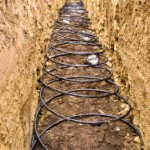It was a day the renewable heating industry had been waiting a long time for. Yesterday (Thursday) saw the Renewable Heat Incentive (RHI) scheme take another step forward following an announcement by the Department of Energy and Climate Change (DECC) which revealed the proposed tariff levels for eligible technologies.
 Back in 2009 the Government first made known its plans to introduce the green heating scheme as a way of encouraging and supporting the uptake of renewable heat technologies such as solar thermal panels, biomass boilers and air source and ground source heat pumps. However, while support for non-domestic RHI installations was first announced last November, consumers and installers alike have remained pretty much in the dark when it came to the tariff levels for residential installations.
Back in 2009 the Government first made known its plans to introduce the green heating scheme as a way of encouraging and supporting the uptake of renewable heat technologies such as solar thermal panels, biomass boilers and air source and ground source heat pumps. However, while support for non-domestic RHI installations was first announced last November, consumers and installers alike have remained pretty much in the dark when it came to the tariff levels for residential installations.
But all that changed yesterday when DECC announced its plans for the scheme and gave a long awaited insight into tariff levels for the eligible technologies. It will operate much like the already established feed-in tariff (FiT) scheme, and will see homeowners get paid for generating their own renewable heat. DECC has published the tariff levels, but has indicated that the rates are subject to a period of consultation and are likely to change. Ofgem will oversee the scheme which, according to DECC, should create an additional 380,000 installations by 2020.
However, for the time being at least the tariff levels have been set at 17.3p/kWh for solar thermal water heating and between 5.2p/kWh to 8.7p/kWh for biomass boilers. Heat pumps will achieve 12.5 to 17.3p/kWh (ground source) and 6.9 to 11.5p/kWh (air source). Payments will be paid out over a seven year period.
DECC also wants to introduce a budget management system which would see the tariff levels decrease in stages, similar to the one recently established for the solar feed-in tariff.
To benefit from the payment scheme, certain strict criteria will apply, which includes:
- Consumers will need to undergo a Green Deal assessment to determine whether they qualify for payments.
- The eligible technologies must have been installed after 15 July 2009.
- Properties must achieve a minimum level of energy efficiency.
- The technologies and the companies who installed the technologies must be MCS certified.
“We need to revolutionise the way we heat our homes and businesses and move away from expensive fossil fuels, not only to cut carbon but to help meet our renewables targets and save money on bills. Our proposals aim to encourage even more uptake of clean green heating in industry and in our businesses,” commented Climate Change Minister Greg Barker.
Although the consultation announcement is a step forward, according to DECC the newly published proposed tariff levels are subject to change as the Government continues to gather information from the Renewable Heat Premium Payment scheme and receives feedback into the consultation, which ends of 7 December 2012.
The renewable heating industry has reacted to the news saying the announcement is welcome after such a long period of time. However the Solar Trade Association (STA) has said the proposed tariff rates for solar hot water systems will be of concern to some of its members, although they note the door has been left open for flexibility on the level of support to be made available. this support level.
“The STA will continue to press DECC to reflect the unique benefits of solar thermal in the final support level decision,” said STA CEO Paul Barwell.
Paul Thompson, Head of Policy at the Renewable Energy Association added that they were pleased the Government had published the proposals and, as with the STA, were looking forward to working with DECC to fine tune the details which would enable the RHI to work successfully.
“Renewable heat has been the sleeping giant of UK renewable energy policy. Renewable heat technologies are often very cost-effective, and have a major role to play in reducing our carbon emissions, improving our energy security, and revitalising our economy,” said Mr Thompson.



In respect of the RHI, how do I calculate the kw/h of my solar thermal system, is it the ammount of energy I would have used on gas, as my system has a 7-1 co-efficient of performance so it only sips energy while churning out hot water ??